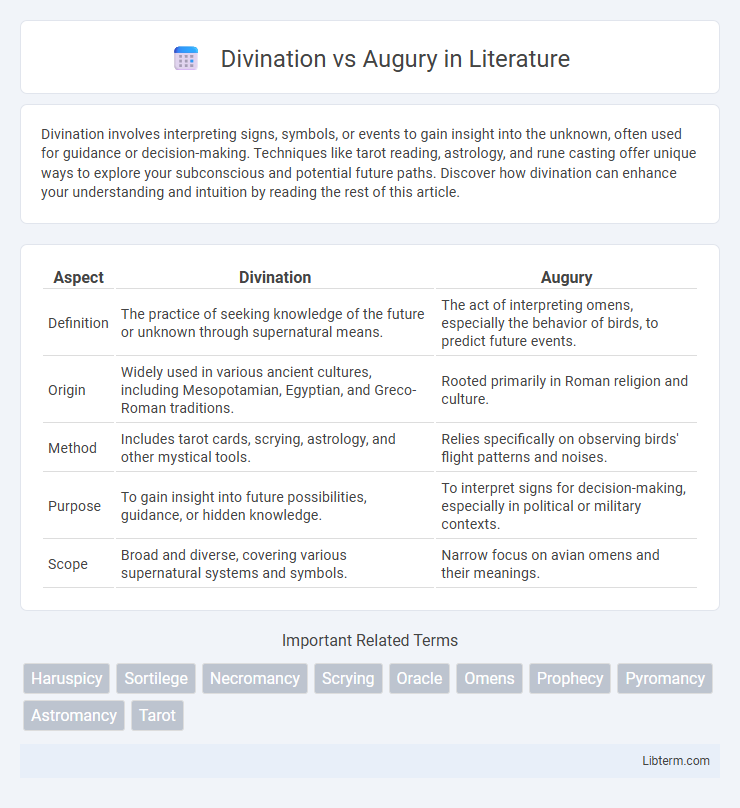Divination involves interpreting signs, symbols, or events to gain insight into the unknown, often used for guidance or decision-making. Techniques like tarot reading, astrology, and rune casting offer unique ways to explore your subconscious and potential future paths. Discover how divination can enhance your understanding and intuition by reading the rest of this article.
Table of Comparison
| Aspect | Divination | Augury |
|---|---|---|
| Definition | The practice of seeking knowledge of the future or unknown through supernatural means. | The act of interpreting omens, especially the behavior of birds, to predict future events. |
| Origin | Widely used in various ancient cultures, including Mesopotamian, Egyptian, and Greco-Roman traditions. | Rooted primarily in Roman religion and culture. |
| Method | Includes tarot cards, scrying, astrology, and other mystical tools. | Relies specifically on observing birds' flight patterns and noises. |
| Purpose | To gain insight into future possibilities, guidance, or hidden knowledge. | To interpret signs for decision-making, especially in political or military contexts. |
| Scope | Broad and diverse, covering various supernatural systems and symbols. | Narrow focus on avian omens and their meanings. |
Understanding Divination and Augury
Divination involves interpreting symbols, signs, or omens to predict future events or gain insight, often using tools like tarot cards, runes, or astrology charts. Augury specifically focuses on observing natural phenomena, especially the behavior of birds, to interpret divine messages and forecast outcomes in ancient Roman practices. Understanding divination requires recognizing its broad symbolic methods, while augury emphasizes ritualistic observation of nature for prophetic insights.
Historical Origins of Divination and Augury
Divination traces back to ancient Mesopotamia, where priests interpreted omens through dreams, stars, and natural events to guide rulers, while augury originated predominantly in ancient Rome, involving the observation of birds' flight patterns and behaviors as a sacred method to predict future outcomes. Both practices served as essential tools for decision-making in their respective cultures, yet divination encompassed a broader spectrum of techniques beyond avian signs, including astrology, haruspicy, and scrying. These historical foundations highlight divination's multifaceted scope contrasted with augury's specialized ritualistic focus on birds as divine messengers.
Key Differences Between Divination and Augury
Divination encompasses a broad range of practices aimed at interpreting signs to predict the future or uncover hidden knowledge, while augury specifically involves interpreting the behavior of birds as omens. Divination methods include tarot reading, scrying, and astrology, whereas augury is traditionally associated with ancient Roman rituals observing bird flight patterns and calls. The key difference lies in divination's general approach to symbolism and insight, contrasted with augury's focused technique using avian signs exclusively.
Methods and Tools of Divination
Divination employs diverse methods such as tarot card reading, astrology, rune casting, and scrying to uncover hidden knowledge or predict future events. Tools commonly used in divination include oracle cards, crystal balls, pendulums, and astrology charts, each facilitating insights through symbolic interpretation. Augury specifically interprets omens from natural signs, primarily the behavior of birds, distinguishing it from broader divination practices.
Techniques and Practices of Augury
Augury, an ancient Roman technique, involves interpreting the behavior and flight patterns of birds to predict future events, often relying on specific species such as crows, eagles, or vultures for accurate readings. This practice requires trained augurs to observe bird movements, calls, and feeding habits at sacred locations to determine divine approval or disapproval. Distinct from other divination methods like haruspicy or astrology, augury emphasizes natural signs in the environment as direct messages from the gods.
Cultural Significance of Divination
Divination holds profound cultural significance across civilizations, serving as a sacred practice to interpret divine messages and guide decision-making. It encompasses various methods, including astrology, tarot, and rune reading, deeply embedded in religious rituals and social customs worldwide. Communities have historically relied on divination to understand fate, seek protection, and legitimize leadership, emphasizing its role in shaping cultural identity and spiritual beliefs.
Augury in Ancient Civilizations
Augury, an ancient divination practice, involved interpreting the will of gods by observing the behavior of birds, particularly their flight patterns and calls, to guide decisions in civilizations like Rome and Greece. This method was crucial in political and military contexts, as augurs served as official priests who performed rituals to secure divine approval before major actions. Unlike broader divination practices that included various methods such as reading entrails or casting lots, augury specifically relied on avian omens to connect human affairs with the divine.
Modern Perspectives on Divination and Augury
Modern perspectives on divination emphasize its role as a psychological tool for self-reflection and decision-making rather than supernatural prophecy. Augury, historically linked to interpreting bird behaviors, is now often regarded as symbolic rituals that facilitate intuition and mindfulness practices. Both divination and augury are increasingly integrated into contemporary spiritual and therapeutic contexts, highlighting their cultural significance beyond traditional religious frameworks.
Ethical Considerations in Divination and Augury
Ethical considerations in divination and augury center on the responsible use of insights to avoid manipulation or harm, emphasizing respect for free will and informed consent. Practitioners are encouraged to maintain transparency about the limitations of their forecasts and refrain from exploiting clients' vulnerabilities. Both methods require adherence to cultural and spiritual values to ensure consultations promote empowerment rather than dependency.
Comparing Divination vs Augury: Which to Choose?
Divination involves interpreting a wide range of signs, symbols, or omens to predict future events or gain insight, while augury specifically focuses on the observation of birds and their behaviors to foretell outcomes. Choosing between divination and augury depends on the desired method's cultural context, accuracy, and personal belief system, as divination offers broader techniques like tarot or astrology, whereas augury relies on natural phenomena. Understanding their differences helps practitioners select the most appropriate form for their spiritual or decision-making needs.
Divination Infographic

 libterm.com
libterm.com